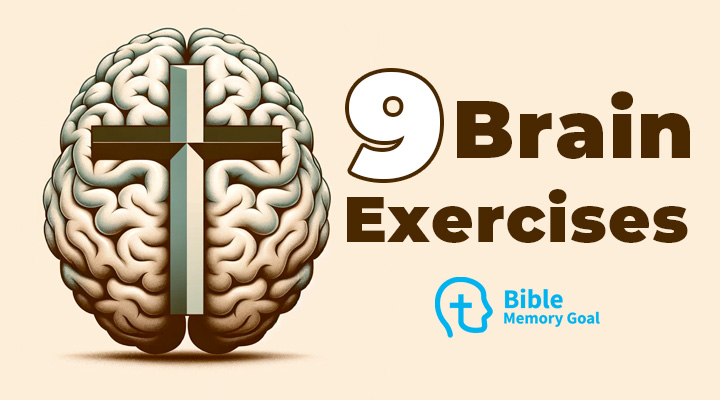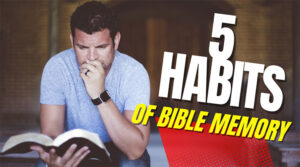You don’t have a bad memory, most of us just do a terrible job exercising our brain muscle. Whether you’re hoping to memorize more Scripture this year, looking to recall what the preacher said during a Sunday morning sermon or wanting to reverse the trend of memory degradation that haunts your family tree, today I’m going to share nine really fun and somewhat challenging exercises that any Christian can do.
Today you’re going to learn 9 fun exercises that you can start doing to stretch your brain muscle. These include:
- Sunday Church “4 Details” Exercise
- Trade TV for Game Time
- Visualize a Parable of the Bible
- “Mix it up!” with Books of the Bible
- Learn the Greek/Hebrew Words
- Pray specifically for 5 people
- Combine Physical + Brain Exercise
- Recall a Week of God’s Blessings
- Use Creative Skills in the Arts
Let’s dive into each of these individually.
“4 Details” Exercise at Sunday Church
The first exercise you can try you can do this Sunday when you go to church. It’s called the “4 Details” exercise modeled after an idea by Dr. Gary Small in his book The Memory Bible.
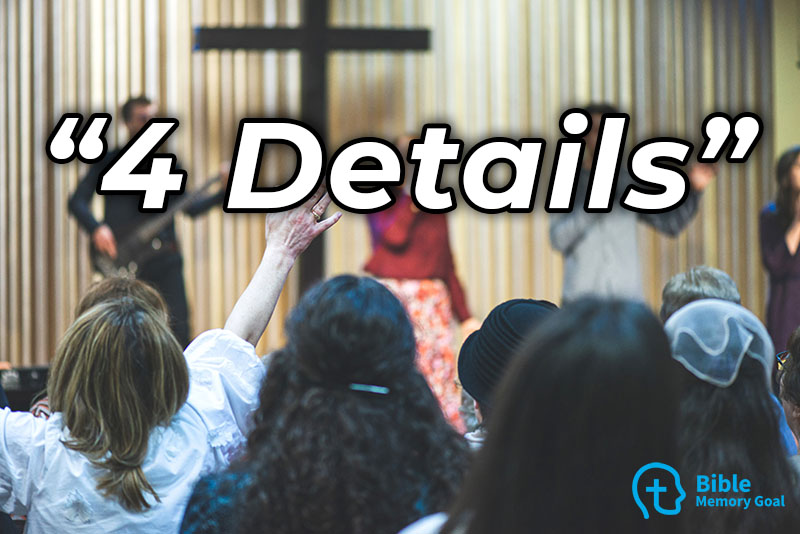
Find somebody that you don’t know – or at least don’t know very well – and have a conversation with them. During this conversation, be intentionally observant. Take note of little details such as:
- What is this person’s name? (if you don’t already know it)
- What is this person wearing?
- What else do you notice about them?
- What exactly are they saying?
Find four things about that person that you can tell either your spouse or friend on the way home.
This exercise requires you to be present in that conversation, to avoid the common surface-level interactions that we tend to have with people at church. This is being very intentional and observant about the conversation and the relationship that you have with this person that you may not know very well.
Trade “TV Time” for “Game Time”
It’s far too easy to come home after a hard day at work, sit down on the couch and turn on the TV. We want to rest and be entertained.
My challenge to you is to try to trade that TV time for some kind of game time.

When I talk about “game time,” this could take a number of different forms, including:
- Crossword puzzles
- Sudoku puzzles
- Family board games
- Card games
We’re trading something that is very passive (being entertained by a TV or a screen on your phone) and trading that for something that is an active activity like a game.
Studies have proven time and again that games are so helpful to our brain and our cognitive function, and if you want to exercise that muscle, engage your family, engage your friends or your spouse in a game instead of sitting down and watching TV.
Visualize a Parable in the Bible
Visualizing is a common technique in the memory world and it’s a great way for Christians to exercise our brain.
What exactly would this look like? The challenge here is to find time to visualize a parable in the Bible, such as the parable of the lost sheep from Luke 15.

To “visualize” means to close your eyes and transport yourself in that place and think of all the different things that are happening, using all the senses that you have.
- Smell the sheep and the clean air.
- Hear the sound of the lambs;
- Feel the cool breeze against your skin;
- Imagine the sun setting behind the hills;
Think about that shepherd counting all of the sheep and coming up one short. Imagine the grief on his face, feel what he feels. And then when he goes to search for the sheep and eventually finds it, think about the joy and the tears of joy that come down his face when he rejoices over the lost sheep!
Visualization is taking all of the senses that you have and trying to employ that to really make yourself present in that story, and you may find that you’ll accidentally memorize the parable by visualizing it. That’s not necessarily the point. I just want you to get into this exercise of visualizing a story, a parable, something in the Bible.
Mix it Up! (Books of the Bible)
Our brains naturally get into a “rut” – and for good reason. This is a more efficient way for our brains to work! But any good brain exercise for Christians will force you to move out of that rut.
For this exercise, you can do one of two things. You can either:
- Write the New Testament Books Backwards: Close your Bible, take a piece of paper and see how long it takes you to write all of the books of the Bible in the New Testament backwards. When you’re done, check the work to see if you missed any!
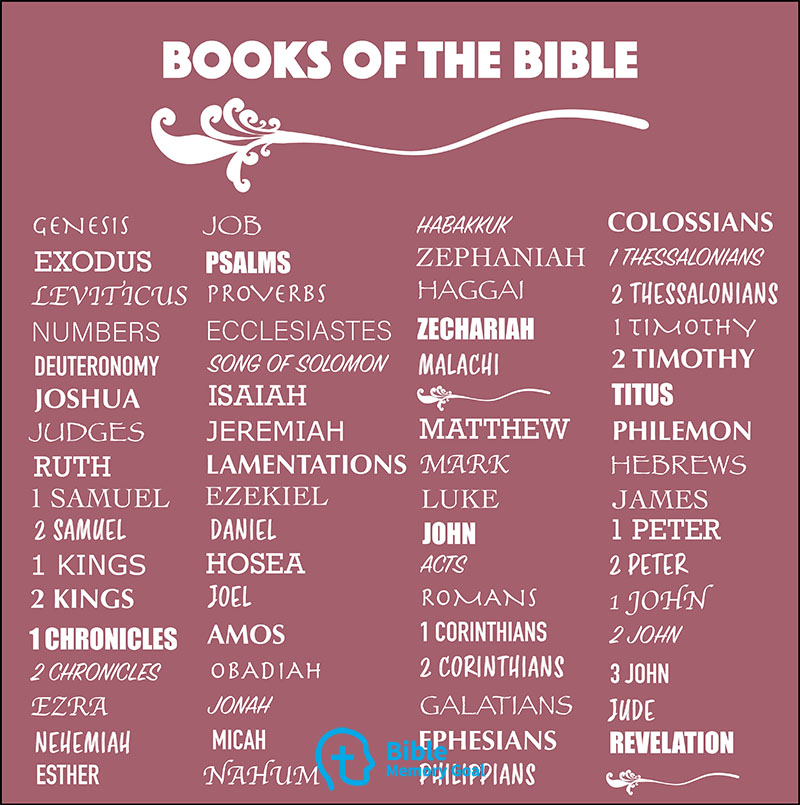
- Say Every Other Book of the Bible: Instead of saying all the books of the Bible in order – Genesis, Exodus, Leviticus, Numbers – say every other book, and you’ll find that it actually takes a little bit of thinking. “Genesis, Leviticus, Deuteronomy, Judges…etc.”
Give it a try. It’s harder than it looks! That process of having to concentrate is a great brain exercise and it’s a lot of fun.
Learn a Greek / Hebrew Word from the Bible
Most brain scientists agree that learning a new language has positive brain effects. It is probably one of the best exercises that you can do for your brain, but that takes a lot of effort and a lot of time!
For this brain exercise, you don’t need to go out and start learning how to speak Spanish, Chinese or even Greek or Hebrew. However, you are being challenged to find a word or phrase in some Bible verse you’ve memorized and learn the original Greek or Hebrew word.
For example, I love how Paul uses the word “partnership” in the book of Philemon (verses 6 and 17), so I used an interlinear Bible to discover that it is the word “koinonia” in the Greek.
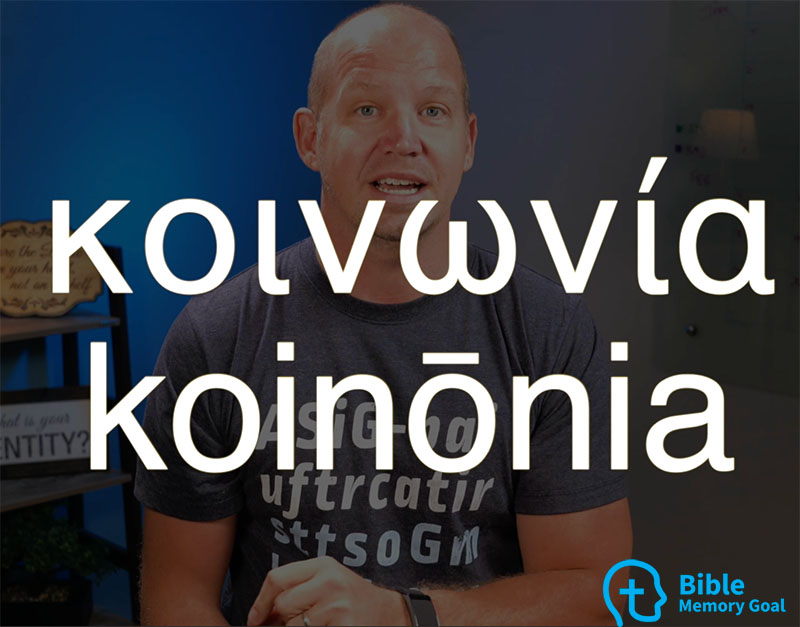
In my Bible memory mind palace, I visualized a gold coin (for “koin-onia”) being put in those two places in the book of Philemon, and that helps me remember the original Greek word.
There are online resources such as the Blue Letter Bible that will give you not only the original word, but also the pronunciation so you don’t end up creating your own incorrect pronunciation.
Memorize a Greek or a Hebrew word this month. If you hear something that your pastor says and you think that’s a word that you want to memorize, then do that. This is an incredible brain exercise!
Pray Specifically for 5 People
Obviously praying is something that we as Christians should be doing at all times.
Pray without ceasing.
1 Thessalonians 5:17
Unfortunately, many times when we pray, we use the same language over and over: “God, please be with…” or “God, would you bless…” or even “God, please comfort…” These aren’t bad phrases, but usually we do this because we don’t want to dig deeper.
For this brain exercise, I challenge you to pray specifically for five people.

Empathize with these people and their individual situations. Try to relate and use language that describes what you’re feeling or understanding about that.
It is engaging your brain and the process of actually visualizing what these people might be going through and empathizing with that. That’s a great thing to do as a Christian in prayer, but it’s also a great exercise for your brain, and I’m trying to find ways that we can combine the two of those.
Combine Physical Exercise w/ Brain Exercise
Brain health is more than just what you do with memory. Your diet affects your cognitive abilities as does physical exercise.
In our Christian culture, we tend to think that time with God always has to be “quiet time.” You’ve got to be in a chair in a meditative state, very quiet. While this kind of time with God is amazing, there is so much benefit to actually exercising while you’re spending time with God.

It doesn’t have to be an intense exercise like running or weightlifting. It can just be a simple walk outside.
It’s great to find ways to exercise your body while you’re also exercising your brain with the Bible. For example, you could:
- Recite and review the Bible verses you’ve memorized;
- Listen to recordings of the Bible passages you want to memorize;
- Do your memory work while walking;
Whatever you choose, start getting active with your brain exercises!
Meditate on God’s Blessings
This idea of meditating can sometimes have a very negative connotation in the modern Christian world, and yet the Bible talks about “meditating on his word day and night” (Psalm 1).
When we talk about meditation here, what I’m referring to is taking time at the end of your week to look back over the entire week to try to see places where God has blessed you or God has given you just abundant grace and mercy.
That means looking through your days – Monday, Tuesday, Wednesday – and actually visualizing where you were, what you were doing and who you were talking to. These are all great mind exercises, but the point of doing this in this type of meditation is to really look back and try to appreciate the fact that God has been with you throughout this entire week.
It’s always good to remember that God has been present and active in your life throughout the entire week!
Use Creative Skills in the Arts
Finally, I challenge you to employ some artistic means of expressing your faith or gratitude to God.
- Are you a musician? Write a new piece of music, with or without lyrics. There are also numerous excellent Scripture music resources available.
- Are you a painter? Copy one of your favorite paintings or create your own based on a story in the Bible.
- Do you love writing? Write a short story or a narrative about how God has shown himself in your life.
- Do you love photography? Go out and take pictures of God’s beautiful creation!
These are ways that engage our mind in a creative way, but are also expressing our faith and our gratitude to God.
Brain Exercises for Christians
I don’t expect you to try to do all of these brain exercises, but I do challenge you to pick a few that you think you can start implementing on a weekly basis in your life.
Not only are we exercising our brain, improving our cognitive function, and hopefully making it easier for us to memorize Scripture, we’re also being very intentional in our relationships with one another and in our relationship with God.
